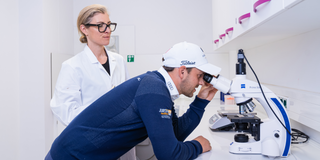Golf from a Sports Science Perspective
Golf is a precision-oriented sport that requires both physical and mental skills. Despite its moderate intensity, golf places high demands on endurance, concentration and coordination.
strain on the musculoskeletal system
Back and spine:
The golf swing is a complex movement that involves a combination of rotation and side-bending. This can lead to significant stress on the lower back, especially if core stability is insufficient.
Shoulders and elbows:
Rotator cuff and elbow tendon strains (known as golfer's elbow) are common injuries that can occur from repetitive swinging motions.
Hip and knee:
The rotational motion of the golf swing can place a lot of strain on the hip joints, while knee problems can be exacerbated by long periods of standing and walking on uneven terrain.
Decline in golf performance
Influence of fatigue:
Fatigue can lead to a significant drop in performance over the course of a round of golf. Mental fatigue affects concentration and precision, while physical fatigue reduces swing power and stability.
Temperature and fluid loss:
Playing in high temperatures can lead to dehydration, which impairs muscle function and increases the risk of injury. A fluid loss of just 2% of body weight can lead to a significant loss of performance.
Nutrition and regeneration:
Inadequate nutrition before and during play can negatively impact energy production. Carbohydrates and electrolytes are essential to maintain energy levels and support mental alertness.
Golf from a nutritional perspective
Effect of nutrition on cognitive abilities
A golfer walks around 9 km on an average round of golf and spends just over 4 hours on the move. Most of this time is spent on moderate physical activity, although this can vary considerably depending on the course-specific and weather-related demands placed on the golfer.
Depending on the length and topography of the course, a golfer loses 1.2 kg of weight per round, while his body has to expend 1000–2500 kcal of energy (depending on body size).
There is a large amount of research that shows that it is important to
(> 60 min) carbohydrates and water in order to avoid significant mental or physical performance losses.
Nutrition before a round of golf
1. Replenish glycogen stores : It is crucial to adequately replenish glycogen stores in the liver and muscles before physical exertion. This can be done by eating carbohydrate-rich foods days before the round of golf.
2. Meal 3-4 hours before start : A balanced meal consisting primarily of long-chain (slowly digested) carbohydrates should be eaten 3-4 hours before the game. A small portion of quickly digested, short-chain carbohydrates can also be helpful.
3. Avoiding difficult-to-digest foods : Avoid consuming large amounts of high-fat or high-fiber foods to avoid delayed gastric emptying and associated energy losses.
4. Moderate protein intake : A moderate amount of protein is necessary to support the body during exercise and especially during post-game recovery.
Nutrition during the round of golf
1. Regular carbohydrate intake : Since golf is a long-term activity, approximately 30-55 grams of carbohydrates should be consumed per hour to maintain physical and mental performance.
2. Avoid high-glycemic foods : To avoid blood sugar spikes, which can lead to a drop in performance, you should avoid foods with a high glycemic index. Only towards the end of the round (eg around hole 16) can a quickly digestible form of carbohydrate be useful in order to get a final energy boost.
Nutrition after a round of golf
1. Refilling the energy stores : After the round of golf, it is important to refill the depleted energy stores
to replenish as quickly as possible. Carbohydrates and proteins are the most important nutrients here.
2. Benefits of short-chain carbohydrates : Short-chain carbohydrates are particularly beneficial shortly after a game because they improve recovery by replenishing glycogen stores.
3. Insulin release through carbohydrates : Consuming high-glycemic carbohydrates after the game promotes the release of insulin, an anabolic hormone that supports the regeneration processes in the body.
water and electrolytes
1. Hydration before the round : Before starting the round of golf, the body should already be sufficiently hydrated. It is recommended to drink 5-7 ml of water per kilogram of body weight half an hour to a quarter of an hour before starting.
2. Hydration during the round : During the game, depending on the weather conditions and body constitution, 4-8 ml of water per kilogram of body weight per hour should be consumed. In case of high perspiration or hot temperatures, fluid intake should be increased.
3. Compensate for electrolyte loss : In case of heavy sweating or high temperatures, isotonic drinks or a sufficient intake of minerals through food should be considered to balance the electrolyte balance.

About Hi1 GOLF
The golf swing – one of the most complicated movements in sport – requires the use of more than 120 muscles and joints at the same time , and concentration must not wane until the end of the round. Therefore, supplying the body with essential micronutrients and vitamins is very important.




